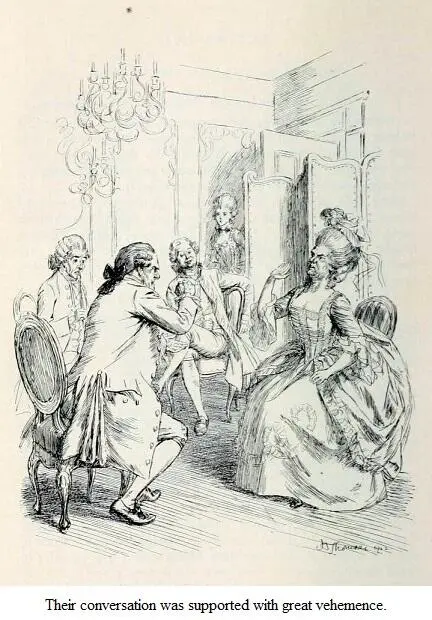I was very glad when Mrs. Mirvan said it was time to be gone. Sir Clement arose to take leave; but the Captain very cordially invited him to join our party: he had an engagement, he said, but would give it up to have that pleasure.
Some little confusion ensued in regard to our manner of setting off. Mrs. Mirvan offered Madame Duval a place in her coach, and proposed that we four females should go all together; however, this she rejected, declaring she would by no means go so far without a gentleman, and wondering so polite a lady could make so English a proposal. Sir Clement Willoughby said, his chariot was waiting at the door, and begged to know if it could be of any use. It was at last decided, that a hackney-coach should be called for Monsieur Du Bois and Madame Duval, in which the Captain, and, at his request, Sir Clement, went also; Mrs. and Miss Mirvan and I had a peaceful and comfortable ride by ourselves.
I doubt not but they quarrelled all the way; for when we met at Ranelagh every one seemed out of humour; and though we joined parties, poor Madame Duval was avoided as much as possible by all but me.
The room was so very much crowded, that but for the uncommon assiduity of Sir Clement Willoughby, we should not have been able to procure a box (which is the name given to the arched recesses that are appropriated for tea-parties) till half the company had retired. As we were taking possession of our places, some ladies of Mrs. Mirvan’s acquaintance stopped to speak to her, and persuaded her to take a round with them. When she returned to us, what was my surprise, to see that Lord Orville had joined her party! The ladies walked on: Mrs. Mirvan seated herself, and made a slight, though respectful, invitation to Lord Orville to drink his tea with us; which, to my no small consternation, he accepted.
I felt a confusion unspeakable at again seeing him, from the recollection of the ridotto adventure: nor did my situation lessen it; for I was seated between Madame Duval and Sir Clement, who seemed as little as myself to desire Lord Orville’s presence. Indeed, the continual wrangling and ill-breeding of Captain Mirvan and Madame Duval made me blush that I belonged to them. And poor Mrs. Mirvan and her amiable daughter had still less reason to be satisfied.

A general silence ensued after he was seated: his appearance, from different motives, gave an universal restraint to every body. What his own reasons were for honouring us with his company, I cannot imagine; unless, indeed, he had a curiosity to know whether I should invent any new impertinence concerning him.
The first speech was made by Madame Duval, who said, “It’s quite a shocking thing to see ladies come to so genteel a place as Ranelagh with hats on; it has a monstrous vulgar look: I can’t think what they wear them for. There is no such a thing to be seen in Paris.”
“Indeed,” cried Sir Clement, “I must own myself no advocate for hats; I am sorry the ladies ever invented or adopted so tantalizing a fashion: for, where there is beauty, they only serve to shade it; and, where there is none, to excite a most unavailing curiosity. I fancy they were originally worn by some young and whimsical coquette.”
“More likely,” answered the Captain, “they were invented by some wrinkled old hag, who’d a mind for to keep the young fellows in chace, let them be never so weary.”
“I don’t know what you may do in England,” cried Madame Duval, “but I know in Paris no woman needn’t be at such a trouble as that to be taken very genteel notice of.”
“Why, will you pretend for to say,” returned the Captain, “that they don’t distinguish the old from the young there as well as here?”
“They don’t make no distinguishments at all,” said she; “they’re vastly too polite.”
“More fools they!” cried the Captain, sneeringly.
“Would to Heaven,” cried, Sir Clement, “that, for our own sakes, we Englishmen too were blest with so accommodating a blindness!”
“Why the devil do you make such a prayer as that?” demanded the Captain: “them are the first foolish words I’ve heard you speak; but I suppose you’re not much used to that sort of work. Did you ever make a prayer before, since you were a sniveler?”
“Ay, now,” cried Madame Duval, “that’s another of the unpolitenesses of you English, to go to talking of such things as that: now in Paris nobody never says nothing about religion, no more than about politics.”
“Why then,” answered he, “it’s a sign they take no more care of their souls than of their country, and so both one and t’other go to old Nick.”
“Well, if they do,” said she, “who’s the worse, so long as they don’t say nothing about it? It’s the tiresomest thing in the world to be always talking of them sort of things, and nobody that’s ever been abroad troubles their heads about them.”
“Pray then,” cried the Captain, “since you know so much of the matter, be so good as to tell us what they do trouble their heads about? — Hey, Sir Clement! han’t we a right to know that much?”
“A very comprehensive question,” said Sir Clement, “and I expect much instruction from the lady’s answer.”
“Come, Madam,” continued the Captain, “never flinch; speak at once; don’t stop for thinking.”
“I assure you I am not going,” answered she; “for as to what they do do, why they’ve enough to do, I promise you, what with one thing or another.”
“But what, what do they do, these famous Monseers?” demanded the Captain; “can’t you tell us? do they game? — or drink? — or fiddle? — or are they jockeys? — or do they spend all their time in flummering old women?”
“As to that, Sir — but indeed I shan’t trouble myself to answer such a parcel of low questions, so don’t ask me no more about it.” And then, to my great vexation, turning to Lord Orville, she said, “Pray, Sir, was you ever in Paris?”
He only bowed.
“And pray, Sir, how did you like it?”
This comprehensive question, as Sir Clement would have called it, though it made him smile, also made him hesitate; however, his answer was expressive of his approbation.
“I thought you would like it, Sir, because you look so like a gentleman. As to the Captain, and as to that other gentleman, why they may very well not like what they don’t know: for I suppose, Sir, you was never abroad?”
“Only three years, Ma’am,” answered Sir Clement, drily.
“Well, that’s very surprising! I should never have thought it: however, I dare say you only kept company with the English.”
“Why, pray, who should he keep company with?” cried the Captain: “what I suppose you’d have him ashamed of his own nation, like some other people not a thousand miles off, on purpose to make his own nation ashamed of him?”
“I’m sure it would be a very good thing if you’d go abroad yourself.”
“How will you make out that, hey, Madam? come, please to tell me, where would be the good of that?”
“Where! why a great deal. They’d make quite another person of you.”
“What, I suppose you’d have me to learn to cut capers? — and dress like a monkey? — and palaver in French gibberish? — hey, would you? — And powder, and daub, and make myself up, like some other folks?”
“I would have you learn to be more politer, Sir, and not to talk to ladies in such a rude, old-fashion way as this. You, Sir, as have been in Paris,” again addressing herself to Lord Orville, “can tell this English gentleman how he’d be despised, if he was to talk in such an ungenteel manner as this before any foreigners. Why, there isn’t a hairdresser, nor a shoemaker, nor nobody, that wouldn’t blush to be in your company.”
Читать дальше













